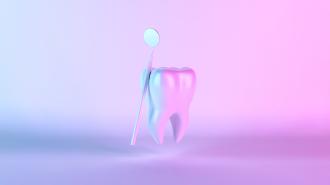Scientists have finally created an artificial tooth enamel as strong as the natural stuff — and it could have applications far beyond the dentist’s office.
The challenge: Tooth enamel is the whitish tissue that covers our teeth. It’s the hardest substance in the human body, but it’s also slightly elastic — those properties help it avoid cracking as we chomp down year after year.
But while enamel is tough, it’s not indestructible — it can wear down over time, and sugar-eating bacteria can produce acids that cause tiny holes (cavities) to form in it.
Our bodies can’t regenerate tooth enamel, and scientists haven’t been able to create a synthetic version that matches the real stuff’s strength and elasticity. As a result, dentists have had to rely on materials that aren’t as ideal as natural enamel when repairing damage to our teeth.
“This method of making artificial enamel lends itself to commercial production.”
Nicholas A. Kotov
Reason to smile: An international team of researchers has now produced an artificial tooth enamel that not only matches the strength and elasticity of natural enamel, but is actually stronger and more durable.
To create it, they coated nanowires of the same material in real tooth enamel — hydroxyapatite — in a nontoxic, metal-based substance. They then used a process involving extreme temperatures to coax the wires into assembling into a structure similar to that of natural enamel.
The artificial tooth enamel could be useful for repairing damaged bones or coating medical implants.
“This method of making artificial enamel lends itself to commercial production, and it can be produced for the manufacture of artificial teeth,” study co-author Nicholas A. Kotov told British newspaper i.
“I would not like to make any predictions about the timing of its actual implementation in patients,” he continued, “but I do know that all the components are biocompatible and can be expected to perform well in both animal and human trials.”
Beyond teeth: Artificial teeth are just one potential medical application for the new synthetic enamel — the material might be useful for repairing damaged bones or coating implants, such as pacemakers.
The synthetic tooth enamel could also have uses outside the body.
“From creating body armor to strengthening or hardening surfaces for floors or cars, there could be many, many applications,” Alvaro Mata, a biomedical engineer at the University of Nottingham, who was not involved with the study, told Science Magazine.
We’d love to hear from you! If you have a comment about this article or if you have a tip for a future Freethink story, please email us at tips@freethink.com.
